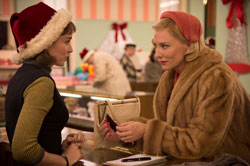The dinner scene is the bane of all screenwriters and filmmakers, and if it is not, it should be. Yet, there is such a scene near the beginning of Carol, the new film by the extraordinarily talented Todd Haynes, and it is wonderful. Elegant and refined housewife Carol (Cate Blanchett) is sharing a meal late at night in a secluded restaurant with department store worker and aspiring photographer Therese (Rooney Mara). In this scene, Carol asks Therese if she lives alone. Therese smiles for a second and says “No.” Then her smile fades a little, and she looks away as she begins her sentence: “Well, there’s Richard…”
Richard is her boyfriend who, like many young men in movies, wants to rush things. As such, she only cares for him in a conventional sense, and not because she truly loves him. Carol, at this part of the film, is in the middle of a divorce and fighting for custody of her daughter. Her husband still loves her, but she does not love him, and her “activities,” shall we say, are in direct contrast to the current flow of societal norms in the 1950s, where the film takes place.
Both women are trying to find themselves by the time they meet each other. Therese has hit a roadblock and doesn’t know how to deal with her lack of enthusiasm for, well, anything. Carol wants everything and does not know how to compromise. Given the time period, it is especially impossible to get everything she wants. At this point I must say that it is pointless to summarize the plot of the film, and your attention must be redirected to the scene I discussed earlier. A smile, a muted but no less enthusiastic “no,” a look away as she catches herself. Stripped down to only its necessities, the emotion left after that exchange is the absolute thrill of what she has just suggested.
Carol is a melodrama of pure sensation. If you haven’t guessed by now, the film charts the romantic relationship between Carol and Therese. It creates its achingly romantic air through glances, sighs, photographs, subjective camerawork, and all those other foolish things directors use in the name of subtlety. For this reason, Carol has a paradoxical effect in which you walk out of the theater not thinking much of it, until it claws at you for hours and you feel you must see it again.
The films of Haynes have a quality about them in which they feel spontaneous and austere at once, which was already evident in his second feature, Safe (1996). Take, for instance, the way Mara and Blanchett’s arms lock during a scene in which they share a bed, or the scene in which they sit next to each other on the floor, and Mara leans in close to Blanchett’s neck to smell what perfume she is wearing. These are meticulously framed, highly designed moments, but much like Jonathan Demme’s movies, they feel electrifying in their externalization of his character’s feelings.
The cinematic lineage can be traced back to Douglas Sirk’s 1950s melodramas, specifically All That Heaven Allows (1954), another film about people who fall in love against the wishes of just about everyone around them (watch it—it’s terrific). Sirk’s films, like those of Haynes’ and much like Carol, force you to not just see the film but to read into it. The look of Carol calls to mind the artifice of a Sirk film, who made it very obvious that it wasn’t really snow, that wasn’t really sunshine, those aren’t the walls of an actual house. Despite the artifice in Carol, it draws us into its world, which is both very convincing of what the world looked like at the time and also an interesting and personal view of the 1950s. Congratulations must be given to the set and costume departments for this reason. The look of the film is involving, and combined with Haynes’ austerity, it makes for many moments in the film in which it feels like shots of photographs, suitcases, and record players simply and overwhelmingly belong.
Though each scene feels like a masterpiece of carefully constructed personal filmmakng, the film is not without its faults. For one, the perspective switches from Therese’s point-of-view to Carol’s in several scenes. Though this provides greater insight into why Carol does what she ends up doing, they are jarring, especially given the subjective camera that acts as Therese’s eyes in many of the scenes. Mara’s character also feels removed of any sort of past, a fault of Phyllis Nagy’s screenplay. She has no family, for instance, and why she is dating Richard in the beginning of the film, given their divergent personalities, seems a mystery. Credit Mara for doing more with the character than she is given to work with. There are also moments where the characters seem too unfair (Richard, particularly) and the yelling matches that occur in the film, though infrequent, feel inorganic and out of place.
However, this does not stop me from naming Carol to be one of my favorite films of 2015, and in many of my first viewing criticisms it feels like I am reaching. In its best and quietest moments, the film feels like Wong Kar-Wai’s In the Mood for Love or Sofia Coppola’s Lost in Translation. Haynes, despite his austerity, never feels like he’s forcing his hand when directing. Audiences and critics that bashed the film on release have confused “subtlety” with “coldness,” to which I respond with, what do you expect? Do you want the characters to say, “I love you,” as often as possible? A nuanced and sensitive filmmaker like Haynes knows that it doesn’t need to be said, merely demonstrated. If these criticizers watched the film with an ounce of attachment, they’d realize that it is as warm, unafraid and equally heartbreaking as any unconventional romance released within the last decade or so.
Given the subject matter of the film, it is also admirable that it lacks any sense of self-righteousness. The film does not condescend to the audience and never points the camera to criticize “society,” choosing to focus instead on the choices that the protagonists make and the personal, not societal, consequences these choices have. The way it handles its subject matter will make sure that it will stand the test of time, along with other great movie romances about forbidden love, like the few mentioned above. It does not walk on eggshells but displays its story unabashedly and without fear, acting as any mainstream romantic film would and feeling it has nothing to prove because of it.
Haynes has magnificent control over the film, and it results in one of the most emotionally freeing, well-acted and beautifully designed films I’ve seen all year. In a modern film world where filmmakers make movies without any semblance of a personal style (Black Mass), or just let their cameras roll until the scene ends (Trainwreck), it is refreshing to see a movie in which a filmmaker actually knows how he wants his film to turn out.
IMAGE TAKEN from collider.com




